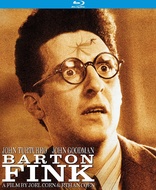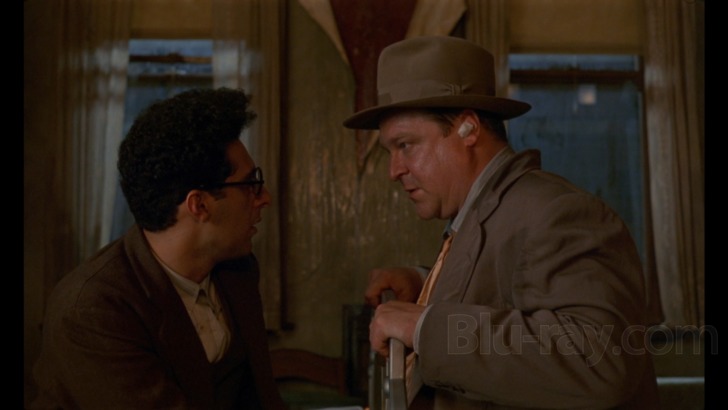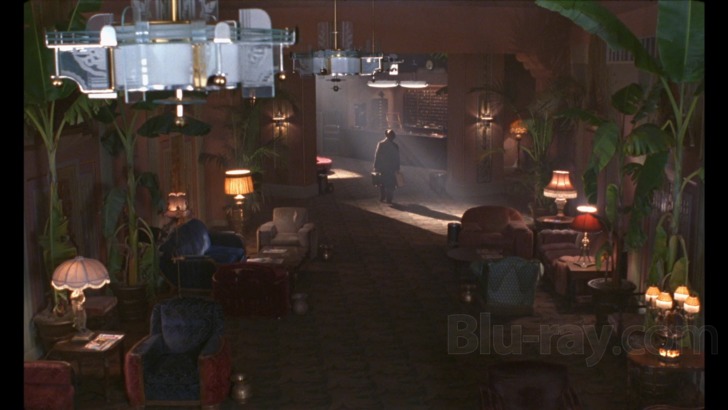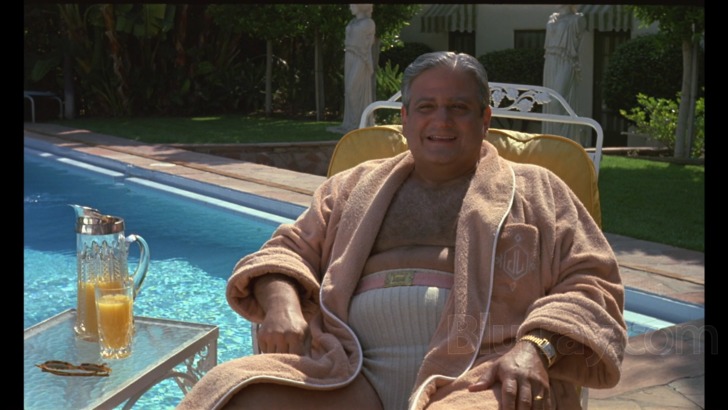Barton Fink Blu-ray Movie
HomeBarton Fink Blu-ray Movie 
Kino Lorber | 1991 | 117 min | Rated R | Aug 22, 2017
Movie rating
7.9 | / 10 |
Blu-ray rating
| Users | 3.8 | |
| Reviewer | 4.0 | |
| Overall | 3.8 |
Overview
Barton Fink (1991)
In 1941, New York intellectual playwright Barton Fink comes to Hollywood to write a Wallace Beery wrestling picture. Staying in the eerie Hotel Earle, Barton develops severe writer's block. His neighbor, jovial insurance salesman Charlie Meadows, tries to help, but Barton continues to struggle as a bizarre sequence of events distracts him even further from his task.
Starring: John Turturro, John Goodman, Judy Davis, Michael Lerner, John MahoneyDirector: Joel Coen, Ethan Coen
| Drama | Uncertain |
| Dark humor | Uncertain |
| Film-Noir | Uncertain |
| Surreal | Uncertain |
Specifications
Video
Video codec: MPEG-4 AVC
Video resolution: 1080p
Aspect ratio: 1.66:1
Original aspect ratio: 1.85:1
Audio
English: DTS-HD Master Audio 2.0 (48kHz, 16-bit)
Subtitles
English SDH
Discs
Blu-ray Disc
Single disc (1 BD)
Playback
Region A (locked)
Review
Rating summary
| Movie | 4.0 | |
| Video | 3.5 | |
| Audio | 4.5 | |
| Extras | 4.0 | |
| Overall | 4.0 |
Barton Fink Blu-ray Movie Review
Reviewed by Brian Orndorf August 15, 2017Joel and Ethan Coen rarely take it easy on audiences, but 1991’s “Barton Fink” is one of their most puzzling, internalized creations. It’s a tough nut to crack, and perhaps it’s never meant to be, deliberately playing with enigmas and limited information to create an unsettling atmosphere of personal and creative disintegration. It’s pure Coen in many aspects, showcasing a tight sense of style and intimidation, but it also offers a few stretches of dark high jinks to preserve the viewing experience. Coming off arguably their finest effort, 1990’s “Miller’s Crossing,” “Barton Fink” plays like an impish purge of creative frustrations and distractions, with the Coen Brothers, tired of managing a lush period piece, electing to plunge within, crafting the most personal psychological drill job of their careers.

A playwright tasting small-scale success in New York, Barton Fink (John Turturro) hopes to achieve a lofty dream of making theater for the “common man,” determined to infuse social and emotional authenticity into his work. However, the lure of big bucks brings him to Los Angeles for a spell, holing up inside the eerily empty Hotel Earle, taking a job at Capitol Pictures to write a wrestling film, urged on by studio chief Lipnick (Michael Lerner). Facing a rare bout of writer’s block inside a decrepit room, Barton teases madness, fixating on everything but the screenplay. Welcome distraction is provided by Charlie (John Goodman), a boisterous neighbor who offers Barton temporary companionship, but as the days pass, complications soon overtake the writer, who’s facing a studio deadline and temptation in Audrey (Judy Davis), the lover of his hero, author W.P. (John Mahoney), a drunk who introduces the first drop of disillusionment that soon causes Barton’s brain to boil with frustration.
“Barton Fink” is many things to many people, but it’s a tale of Polanski-scented horror at heart. The threat doesn’t necessarily emerge from an external source, finding Barton’s tormented by his own mind, a once trustworthy friend that served him well in New York, wowing the elite with plays teeming with working class woe, playing into his desire to take theater from the privileged and hand it over to the masses, allowing the unwashed to stare into a mirror for two hours and ponder their own existence. In Los Angeles, Barton is powerless, a stranger in a strange land, taking refuge in the Hotel Earle, which only employs two people, including bellhop Chet (Steve Buscemi), tasked with creating B-movie drama inside a room that’s filthy, with peeling wallpaper that ejaculates glue, while a pesky mosquito keeps the writer on edge, feasted on at night. It’s Hell, Coen-style, with the devil himself the very process of writing without inspiration, keeping Barton in front of a blank page, facing his worst nightmare during a lucrative opportunity.
Atmosphere is king in “Barton Fink,” with the Coens making viewers feel every twitch in the character’s body. It’s the finest performance in Turturro’s career, embodying slack-jawed fright when faced with the character’s creative futility, and there’s delight in Barton’s elevation of nobility as he discusses his sympathy for the common man, amusingly dismissing elitism while participating in the tradition, with Charlie subjected to the ravings of a confused man. Turturro is posed perfectly by the Coens, but there’s thespian might here as well, making sweet music with Goodman, who’s ideally cast as the apple-cheeked everyman who possesses a darkness Barton never seems to pick up on. The ensemble is terrific, broad yet precise, giving the Coen Brothers opportunities to mount satiric industry jabs, with specific attention on creative bankruptcy, and the gang plays the nightmare just right, giving the production a human element as cinematographer Roger Deakins and the directors fiddle with every corner of the frame, crafting a direct depiction of a man’s slow-burn unraveling.
Barton Fink Blu-ray Movie, Video Quality 

There's nothing above and beyond about the AVC encoded image (1.66:1 aspect ratio) presentation for "Barton Fink," which remains serviceable. It's not a fresh scan, limiting a true cinematic presence, but detail is adequate, which is useful for a movie about extreme textures and harsh close-ups. Sickly facial particulars survive, along with eerie set decoration, including the goopy, peeling wallpaper, and typewriter specifics retain their precision. Colors are passable, but a bit muted, doing best with bright costuming and evil interiors, including the forbidding reds of the hotel. Skintones are largely natural. Delineation is acceptable. Source is okay, with debris surprisingly common, including hairs on several of the shots.
Barton Fink Blu-ray Movie, Audio Quality 

The 2.0 DTS-HD MA sound mix plays a critical part in "Barton Fink," perhaps more of a lead character than Barton himself. The essentials are covered to satisfaction, leading with dialogue exchanges that sound crisp and direct, handling performance volume and comedic speeds, losing nothing along the way. Scoring is also healthy, offering bright instrumentation to nail the unsettling mood, supporting tone without overwhelming it. Sound effects are prized, creating an appropriate feel of claustrophobia, industry bustle, and pictorial escape with oceanic movement.
Barton Fink Blu-ray Movie, Special Features and Extras 

- Interview (14:28, HD) with John Turturro doesn't really have a specific flow, following the actor's lead as he recalls his preparation period for "Barton Fink," which required time in secretary school to learn how to type, and a general move from New York to Los Angeles, expecting the birth of his first child during the shoot. Turturro seems pleasingly puzzled by the "strange film," sharing the rigid work schedule the Coens prepared, with the star using time in front of a typewriter to work on his own projects, including "Romance & Cigarettes." Turturro mentions the feature's dominance at the Cannes Film Festival, the Coen creative process, and his understandable fears when working around fire in the picture's conclusion.
- Interview (15:52, HD) with Michael Lerner is quite a lively discussion of just about everything, opening with a blunt assessment of a Cuban cigar, which he works on during the chat. Lerner is a real performer, a complete character, and he's incredibly amusing to watch as he acts out his stories from the "Barton Fink" audition and time researching studio moguls -- a personal passion for the actor, who's played plenty of them. Lerner takes a sharp detour in philosophy and the power of fables, but he remains excitable and a bit cantankerous, carrying on wildly to make the whole interview memorable.
- Interview (12:00, HD) with executive producer Ben Barenholtz is a little short on information, with the subject openly admitting he doesn't do much for the Coens besides provide encouragement during their development process. Perhaps he's being humble, but Barenholtz shares only a brief history with the Coens, highlighting difficulties during the production of "Miller's Crossing," where the filmmakers retreated to Minneapolis for a short time to figure out the ending, possibly banging out "Barton Fink" during this critical downtime to achieve clarity. Barenholtz is also asked about his role as the originator of the midnight movie, sharing his thoughts on distribution difficulties for odd features for specific audiences.
- Interview (20:01, HD) with composer Carter Burwell and supervising sound editor Skip Lievsay is a deep dive into the aural achievements of "Barton Fink." Personal histories are established, with Lievsay bringing Burwell to the attention of the Coen Brothers, and a lengthy deconstruction of tone and sound is examined, detailing the creative process. Examples are utilized, with Lievsay dissecting the unnatural ringing of the hotel lobby bell, and Burwell shares a story of a possible musical mistake only caught because of his presence during the final mix.
- Deleted Scenes (all SD) are numbered #1 (:42), #2 (3:26), #3 (1:16), #4 (1:05), #5 (:43), #6 (1:10), #7 (2:28), and #8 (2:15). All are minor additions at best, mixed in with final cut footage, with the most interesting being a slightly extended ending that adds another victim to the hotel rampage.
- And a Theatrical Trailer (2:25, SD) is included.
Barton Fink Blu-ray Movie, Overall Score and Recommendation 

"Barton Fink" is interpretational, with items such as a mystery box about the size of a severed head gifted from Charlie to Barton just one of many questions that are never answered in the movie. The Coens prefer the question marks, doing their best to screw with assessments, which keeps the effort at arm's length but still engrossing, even when it swerves into overkill in the finale. "Barton Fink" isn't premiere Joel and Ethan Coen, but it's a primal picture from the pair, who aren't known for their ability to sit in one spot, stewing in juices for very long. Its end game is indistinct, but the feature is funny and disturbing, which is exactly what it should be.
Similar titles
Similar titles you might also like

A Serious Man
2009

After Hours 4K
1985

Sweet Smell of Success
1957

Ace in the Hole
1951

Adaptation. 4K
2002

Synecdoche, New York
2008

The Lost Weekend
1945

Little Miss Sunshine
2006

The King of Comedy
1982

The Royal Tenenbaums
2001

Wonder Wheel
2017

Mean Streets 4K
1973

Sunset Boulevard 4K
75th Anniversary
1950

A Safe Place
1971

Miller's Crossing
1990

Birdman
Birdman or (The Unexpected Virtue of Ignorance)
2014

Network
1976

Calvary
2014

The Man Who Wasn't There
2001

One Flew Over the Cuckoo's Nest 4K
Limited Editon
1975